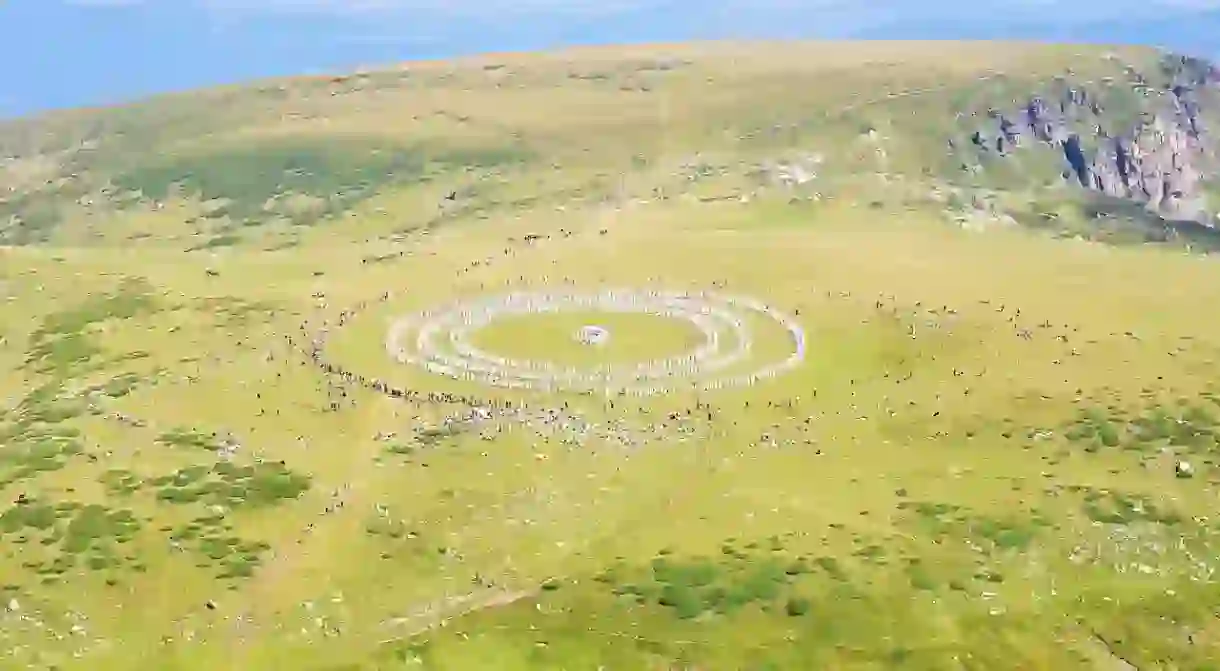Spiritual Places to Visit in Bulgaria

Although Bulgaria is predominantly an Orthodox Christian country, Christian churches and cathedrals are not the only spiritual places you can visit on your trip. From mosques and a Buddhist stupa to natural spots considered to be ‘loaded’ with energy and places of worship of local prophets, these are the most interesting destinations for exploring the spiritual world of Bulgaria.
Rila Monastery
Rila Monastery is the biggest Bulgarian monastery in the country. It is on the UNESCO World Heritage List, and is one of the most popular day trips from Sofia. It was named after the most cherished Bulgarian saint, Saint Ivan from Rila, which makes it a truly special place for Bulgarians. The colorful buildings of the monastery and the devoted pilgrims saying their prayers in the barely lit churches make Rila Monastery a must-visit destination. Don’t leave before seeing Rafail’s Cross, a wooden crucifix with 104 biblical scenes intricately carved in it.

The Buddhist stupa near Sofia
Although Buddhists in Bulgaria are a tiny religious minority, the first Buddhist stupa was built not far from Sofia in 2015. The stupa was built on a scenic hill on the outskirts of the mountain village of Plana, about an hour’s drive from the capital. Both curious tourists and practitioners visiting to be reminded of the perfect nature of the human mind are welcome to sit on the benches or in the grass by the stupa and admire the three mountains surrounding it.
Demir Baba Teke near Isperih
Open to people of all religions, Demir Baba Teke is a special spiritual place believed to possess healing powers. It is a mausoleum for Demir Baba, a sixteenth-century saint and healer of the Alevism branch of Islam. Alevism is known for being tolerant to all other religions. Sick people from all over the country come here to follow the healing rituals of the sacred place. It is believed that if you tie a piece of cloth to a tree branch near the mausoleum, your illness will remain on the branch. The water from the spring in the mausoleum’s yard is also considered to be healing.

Dzhumaya Mosque in Plovdiv
Muslims are the second largest religious community in Bulgaria with mosques built in many cities. One of the most beautiful among them is the Dzhumaya Mosque in the center of Plovdiv. The more than 600-year-old building has been renovated and lined with palm trees, thus turning it into a sight that appears Middle Eastern. You can visit the mosque as a tourist and then stop for Turkish coffee and mouth-watering sweets at the café in front of it.
The Buzovgrad megalith near Kazanlak
Before the founding of the Bulgarian State in 681, its territory was long inhabited by the Thracian tribes. Although much of their architecture survived, such as tombs, rock-hewn sanctuaries and temples, they remain quite mysterious because of a lack of written script, and not much information is known about their rituals and beliefs. What archaeologists know for sure is that the Thracians had a strong cult that worshiped the sun, and many of their sanctuaries were dedicated to it, like the one near the village of Buzovgrad and the town of Kazanlak in the heart of the Rose Valley. Every year, on the morning of the summer solstice, people gather at the megalith known as Sun Gate and re-enact what they believe the sun rituals were.

Rupite near Petrich
Rupite is a tiny village in Southern Bulgaria that attracts hundreds of Bulgarians year-round. What drives all these people here is the church and grave of Baba Vanga, the most famous Bulgarian mystic and healer, known for what many believed were paranormal abilities and the accuracy of her prophecies. Blind Baba Vanga spent her whole life helping people that flocked to her home from all over Bulgaria and abroad in search of answers or recovery. After her death, according to her will, she was buried near the house where she accepted visitors, so she could continue to help others even after death.
The Seven Rila Lakes on Rila Mountain
Regarding spirituality that doesn’t necessarily relate to a certain religions, the most popular movement in Bulgaria is the White Brotherhood. Its followers stick to the teachings of Peter Deunov, creator of what is often called a separate form of esoteric Christianity based on beliefs about the integrity of body, spirit and the Universe. Every summer, on August 19, hundreds of followers of the White Brotherhood gather at the Seven Rila Lakes on Rila Mountain to perform their dance called paneurhythmy. The place was chosen by Deunov himself, who used to take his followers there for the dance.













